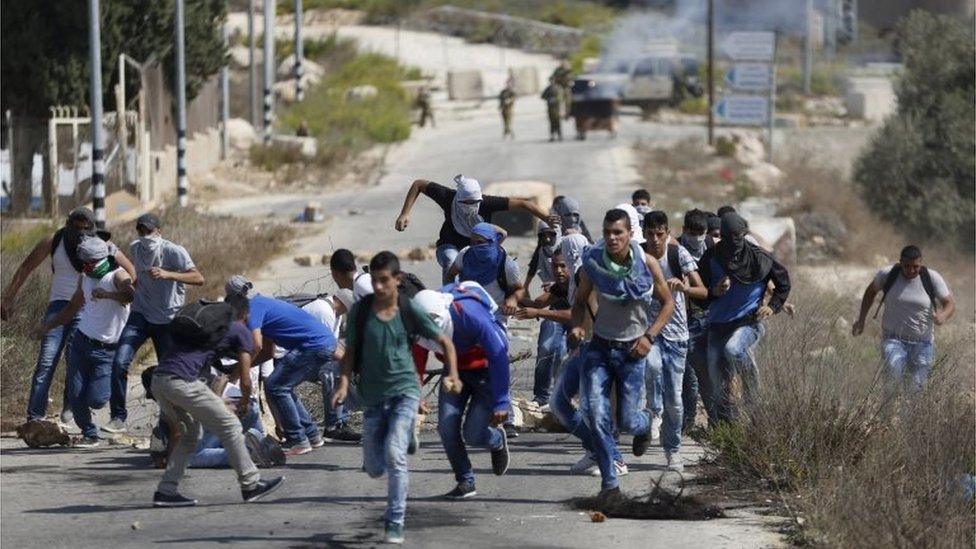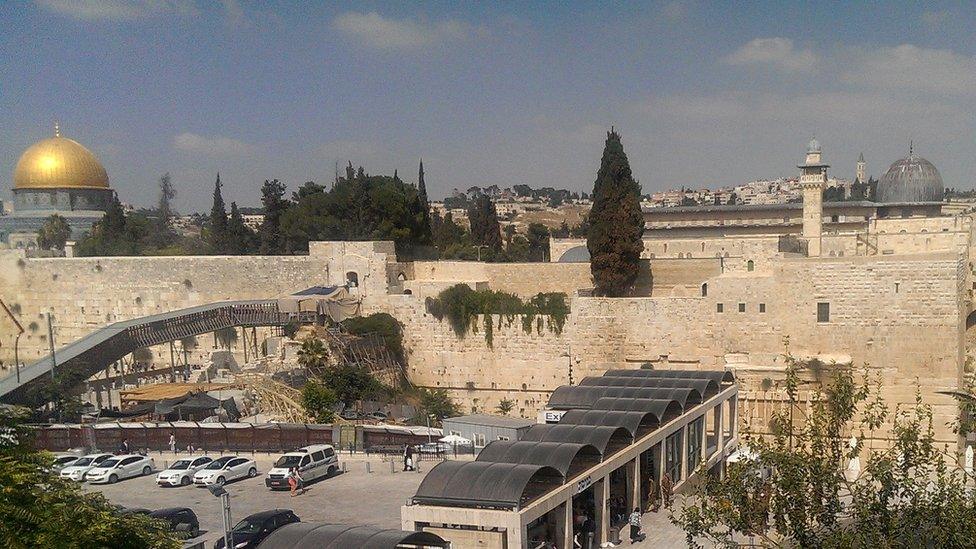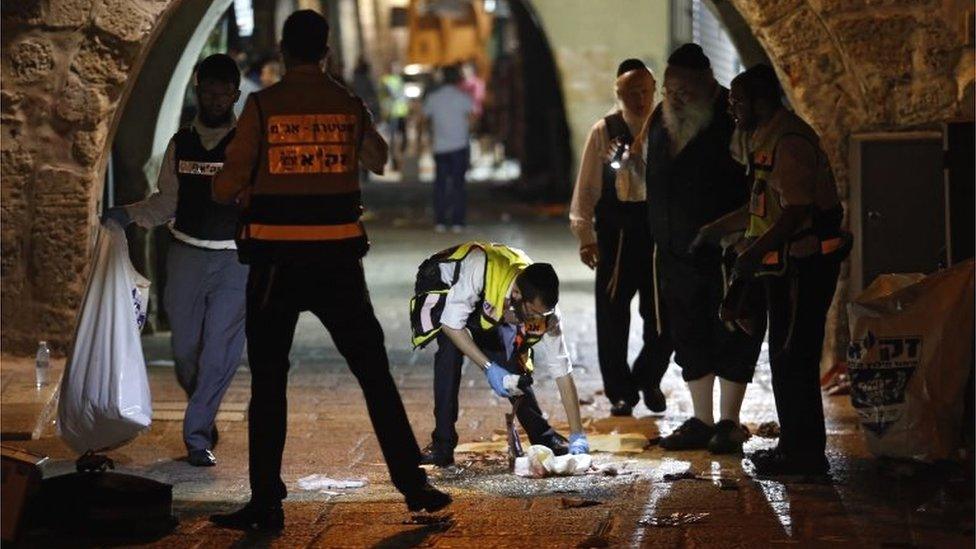Can Israel and the Palestinians contain spiralling violence?
- Published

Tensions between Israel and the Palestinians have been steadily rising for weeks
After a week which has seen a sharp and sudden escalation of violence in Jerusalem and the Israeli-occupied West Bank, the mood on both sides of the deep and bitter political divide is both edgy and angry.
Israelis are outraged by two attacks by Palestinians - a drive-by shooting on a road between two Jewish settlements near the Palestinian city of Nablus and a stabbing in the crowded streets of the Old City of Jerusalem.
The heightened tensions can be traced a few weeks ago to the start of the Jewish High Holiday, when an increase in incidents involving rocks thrown at Israeli cars on the West Bank began to be reported.
Palestinians are incensed not just at the severity of the security crackdown which has followed - including the death of demonstrators, reportedly during clashes - but at the increase in Jewish religious activity in the Old City which comes with the festival of Sukkot - a traditional time of pilgrimage to Jerusalem for Jews.
That pilgrimage to the Western Wall, a holy place of prayer in Judaism, brings the visitors into close proximity with the al-Aqsa mosque, which is sacred to Muslims.
In both Palestinian society and in the wider Arab world, the increased religious activity is viewed as a kind of attack on the Islamic identity of the place where Muslims believe that the Prophet Muhammad ascended body and soul into heaven.
Jews revere the compound which contains the mosque as their holiest place and those competing religious convictions have proven repeatedly over many decades they have the power to trigger sudden and deadly upsurges in violence.

The site of the Western Wall (left) and the al-Aqsa Mosque (right) has long been a flashpoint for violence
Israel has been in control of the Old City of Jerusalem since it captured it from Jordan in the war of 1967, but it handed control of the compound almost immediately to an Islamic agency - the Waqf - in what was an explicit recognition of the incendiary potential of the issue.
Since then a status quo has prevailed under which Jews are allowed to visit the site but not to pray there.
There are two problems with that.
First there is a minority within Judaism that wants to challenge that arrangement and assert a Jewish right of prayer at the site; second, many people in the Arab world simply do not believe repeated Israeli assurances that there are no plans to change that status quo.
So the anger felt on both sides is easy to explain. But the pervasive sense of anxiety is more complex.
New intifada?
One Israeli newspaper, Yediot Ahronot, reflecting on the attacks, declared baldly that a third Palestinian intifada (uprising) is under way.
Others are slightly more cautious - a columnist in Haaretz asks the same question but concludes that it is too early to say.
It is clear though that a new style of attack is emerging to which Israel is struggling to formulate a convincing response.
The stabbings in the Old City at the weekend are a good example.

A spate of deadly attacks by Palestinians on Israelis has led to a security clampdown
The 19-year-old attacker Mohannad Halabi may or may not have been a member of a militant organisation, but he equipped himself to kill simply by taking a knife from his home.
Other attacks have consisted simply of Palestinian drivers aiming their cars at pedestrians they assume to be Israeli Jews.
Israel has powerful military forces in the West Bank, sophisticated surveillance techniques at its disposal and an extensive network of informers.
But none of those things can guard against an individual making a personal decision to stage an attack at a time of his own choosing and carrying out with whatever tools come to hand in his ordinary daily life.
Extremist groups make themselves vulnerable when they store and transport firearms or pass communications between members, however attacks which involve none of those weak points are difficult for security forces to disrupt.
Growing despondency
On the Palestinian side there is a persistent sense of resentment at continuing Israeli occupation which is intensified not just by the circumstances around the al-Aqsa compound but also by the widespread sense that the whole issue of the two-state solution has been allowed to drift off the international agenda.
It is hard to remember a time when so little diplomatic effort was put into the search for a solution to the long-running issue between Israel and the Palestinians.

Palestinian dead include an 18-year-old, shot by troops during clashes in the West Bank
In part of course it has simply been overshadowed by events in Syria and by nuclear diplomacy with Iran, which tended to suck the oxygen out of other political issues in the region.
But the truth is that what used to be called "The Peace Process" simply feels moribund.
Few believe that the Palestinian leader Mahmoud Abbas and the Israeli Prime Minister Benjamin Netanyahu will ever make the kind of compromises necessary to reach a deal.
Unpredictable path
The Palestinian Authority still operates a security co-operation agreement with Israel, but that arrangement could be vulnerable if the political atmosphere continues to deteriorate.
Repudiating the arrangement, as he has threatened to, would be a big step for Mr Abbas, but he cannot afford to appear to be too far out of step with his own people on the issue.
It would be hard for him to explain why his security officials are working so closely with the same Israeli forces that Palestinian demonstrators are confronting on the streets in the West Bank.
The truth is that no-one can really predict what will happen next.
The sudden uptick of violence over the course of the last few days may subside equally suddenly or it may trigger a further escalation.
The real reason for that sense of anxiety on both sides perhaps is the sense that, as so often in the Middle East, politicians and security officials do not appear to be in control of events but are rather at their mercy.